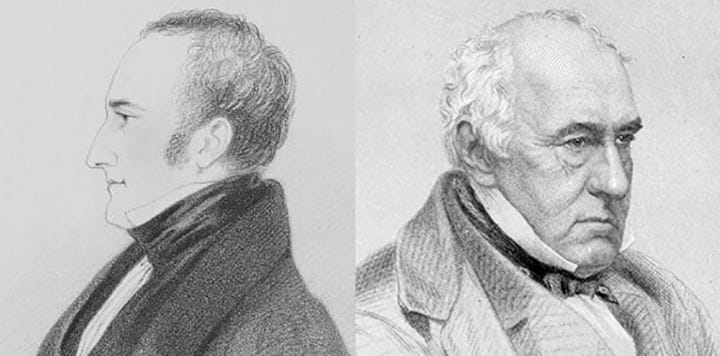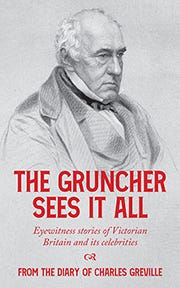How can anyone like such a life? 1838
Whose head was like a pineapple? And who had a very nice horse?
The Queen is not clever, and everything is done by the Prince who is to all intents King. She acts in everything by his inspiration and never writes a letter he does not dictate every word of. His knowledge and information are astonishing and there is not a department of the Government regarding all the detail and management of which he is not much better informed and more capable than the Minister at the head of it…
It is perhaps little wonder that the diarist who wrote these words (in October 1857) was described by the queen in question – Victoria, of course – as a man of “indiscretion, indelicacy, ingratitude, betrayal of confidence and shameful disloyalty towards his Sovereign”. He died in 1865, and his extensive journals weren’t published until nine years later, which prompted this outburst in Victoria’s own diary (which we’ve dipped into before – from 1851, 1865, 1887 and 1897) – she also said she was “horrified and indignant at this dreadful and really scandalous book” and it was “very important that the book should be severely censored and discredited”. Not amused, eh?
It’s not that surprising, really. Back in 1831 he’d also described her as a “short vulgar-looking child” and in 1840 “a spoilt child only intent upon the gratification of her social predilections”. Everyday sexism, perhaps? But he had stronger words still to say about her predecessors (hence her comment that “the tone in which he speaks of royalty is unlike anything which one sees in history”).
He described George IV (1762–1830) as a “worthless dog” and his diary entry of 12th January 1829 gives us this pen portrait:
The King’s indolence is so great that it is next to impossible to get him to do even the most ordinary business… His greatest delight is to make those who have business to transact with him, or to lay papers before him, wait in his anteroom while he is lounging with Mount Charles or anybody, talking of horses or any trivial matter; and when he is told, ‘Sir, there is Watson waiting,’ &c., he replies, ‘Damn Watson; let him wait.’ He does it on purpose, and likes it.
This account corresponds with all I have before heard, and confirms the opinion I have long had that a more contemptible, cowardly, selfish, unfeeling dog does not exist than this King, on whom such flattery is constantly lavished. He has a sort of capricious good-nature, arising however out of no good principle or good feeling, but which is of use to him, as it cancels in a moment and at small cost a long score of misconduct… The littleness of his character prevents his displaying the dangerous faults that belong to great minds, but with vices and weaknesses of the lowest and most contemptible order it would be difficult to find a disposition more abundantly furnished.
Ouch. And our writer was of the general opinion “there have been good and wise kings, but not many of them”. George’s successor, his brother William IV, would also not escape the diarist’s invective (including the observation that his head was shaped like a pineapple). On the day after William’s death in June 1837, he wrote:
William IV was a man who, coming to the throne at the mature age of sixty-five, was so excited by the exaltation, that he nearly went mad, and distinguished himself by a thousand extravagances of language and conduct, to the alarm or amusement of all who witnessed his strange freaks; and though he was shortly afterwards sobered down into more becoming habits, he always continued to be something of a blackguard and something more of a buffoon.
It’s not all bad about William (or indeed Victoria, and we’ve seen his praise for Prince Albert already), as this passage continues:
It is but fair to his memory at the same time to say that he was a good-natured, kind-hearted, and well-meaning man and he always acted an honourable and straightforward, if not always a sound and discreet, part…
The young Queen, who might well be either dazzled or confounded with the grandeur and novelty of her situation, seems neither the one nor the other, and behaves with a decorum and propriety beyond her years, and with all the sedateness and dignity the want of which was so conspicuous in her uncle.
Damning with faint praise, perhaps. But wait – I haven’t even said who this writer is yet. One edition of his extensive journals describes him as the best diarist since Samuel Pepys, and others have described him as one of the most important sources for 19th century British history – but I’d wager you might not even have heard of him. And what sort of a man would be so scathing about each monarch in this golden age of empire?
Charles Cavendish Fulke Greville was born on 2 April 1794, growing up in a massive country house in Buckinghamshire. His maternal grandfather was the Duke of Portland (twice prime minister) and his lineage was littered with barons, dukes, politicians and senior members of the establishment. As a child he was a page of honour to George III, and he was educated at Eton and Christ Church, Oxford. As an adult, he was Clerk of the Privy Council – a senior civil servant – for forty years (before that he was briefly secretary of Jamaica, which he never even visited). Not a man, therefore, who seems an obvious anti-royalist. And he wasn’t, of course – he was simply a sharp critic of people’s follies, which his close connections to the machinery of government gave him a ringside seat for.
If it wasn’t for the two million words of his diaries – written for most of the years between 1814 and 1860, and which were an instant bestseller, selling out through five editions in their first year or so – he probably wouldn’t be known for anything today, other than perhaps for his other small career between 1819 and 1827 as a first-class cricketer in the Marylebone Cricket Club. (He was also an active racehorse owner and gambler like our last diarist.)
But his writing is compelling, given that proximity to the great and the good, offering incisive commentary on current affairs, clearly written with an eye to posterity. Like many an acerbic commentator before him, he was driven by honesty and a respect for the truth – “there is always something to be learned from everybody if you touch them on the points they know,” he wrote. He was equally a harsh critic of himself, upbraiding his own gambling and other habits.
According to the Dictionary of National Biography, he was known in later life as ‘the Gruncher’1 – a grumpy old man exasperated by his gout and deafness, who the aristocratic poet Emily Eden described as “crosser than any pair of tongs”. Perhaps that’s why he never married, although he had a series of mistresses, one of whom bore him a son who sadly died as a young man.
I’m going to return to Greville next time, because I want to explore his sympathetic and insightful comments on a particular scourge of his age – but that’s to come. This week let’s go back to Victoria, and Greville’s entertaining description of a chat with her that might perhaps resonate with anyone who has met royalty in our age too…2
March 11th, 1838
I dined yesterday at the Palace, much to my surprise, for I had no expectation of an invitation. There was a very numerous party… We assembled in the round room next the gallery, and just before the dinner was ready the Queen entered with the Duchess of Kent, preceded by the Chamberlain, and followed by her six ladies. She shook hands with the women, and made a sweeping bow to the men, and directly went in to dinner… The dinner was like any other great dinner. After the eating was over, the Queen’s health was given by Cavendish,3 who sat at one end of the table, and everybody got up to drink it: a vile, vulgar custom, and, however proper it may be to drink her health elsewhere, it is bad taste to have it given by her own officer at her own table, which, in fact, is the only private table it is ever drunk at…
The Queen sat for some time at table, talking away very merrily to her neighbours, and the men remained about a quarter of an hour after the ladies. When we went into the drawing-room, and huddled about the door in the sort of half-shy, half-awkward way people do, the Queen advanced to meet us, and spoke to everybody in succession, and if everybody’s ‘palaver’ was as deeply interesting as mine, it would have been worthwhile to have had Gurney to take it down in shorthand.4 As the words of Kings and Queens are precious and as a fair sample of an after-dinner colloquy, I shall recall my dialogue with accurate fidelity.
Q. Have you been riding today Mr Greville?
G. No Madam. I have not.
Q. It was a fine day.
G. Yes ma’am a very fine day.
Q. It was rather cold though.
G. (like Polonius). It was rather cold, Madam.
Q. Your sister, Lady Francis Egerton, rides, I think, does not she?
G. She does ride sometimes Madam.
(A pause when I took the lead, though adhering to the same topic.)
G. Has your Majesty been riding today?
Q. (with animation) O yes, a very long ride.
G. Has your Majesty a nice horse?
Q. O, a very nice horse.
Gracious smile and inclination of head on part of Queen, profound bow on mine, and then She turned again to Lord Grey. Directly after I was (to my satisfaction) deposited at the whist table to make up the Duchess of Kent’s party, and all the rest of the company were arranged about a large round table (the Queen on the sofa by it), where they passed about an hour and a half in what was probably the smallest possible talk, interrupted and enlivened, however, by some songs which Lord Ossulston sang…
To form an opinion or the slightest notion of her real character and capacity from such a formal affair as this, is manifestly impossible. Nobody expects from her any clever, amusing, or interesting talk, above all no stranger can expect it. She is very civil to everybody, and there is more of frankness, cordiality, and good-humour in her manner than of dignity. She looks and speaks cheerfully: there was nothing to criticise, nothing particularly to admire. The whole thing seemed to be dull, perhaps unavoidably so, but still so dull that it is a marvel how anybody can like such a life.
Greville’s such an entertaining writer, connected to so many luminaries of his day, I’m putting together a new edition of highlights of his diaries. You can pre-order it now at half price!
The word appears to come from the French for grumpy, grincheux, and therefore is basically the same as the Grinch!
This is Henry Cavendish, the queen’s chief equerry at the time, and son of the Earl of Burlington.
Thomas Gurney (1705–1770) invented a form of shorthand to assist with recording proceedings at the Old Bailey.




